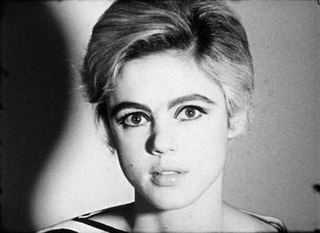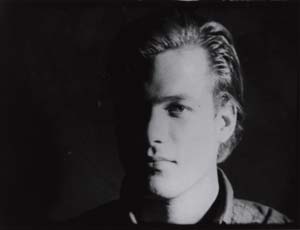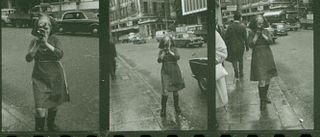Related Research Articles

Paul Morrissey is an American film director, known for his early association with Andy Warhol. His most famous films include Flesh, Trash (1970), Heat, Flesh for Frankenstein (1973) and Blood for Dracula (1974), all starring Joe Dallesandro, 1971's Women in Revolt and the 1980's New York trilogy Forty Deuce (1982), Mixed Blood and Spike of Bensonhurst (1988).

Edith Minturn Sedgwick Post was an American actress, model, and socialite, who was one of Andy Warhol's superstars, starring in several of his short films during the 1960s. Her prominence led to her being dubbed an "It Girl", while Vogue magazine named her a "Youthquaker".
Warhol superstars were a clique of New York City personalities promoted by the pop artist Andy Warhol during the 1960s and early 1970s. These personalities appeared in Warhol's artworks and accompanied him in his social life, epitomizing his dictum, "In the future everyone will be famous for fifteen minutes". Warhol would simply film them, and declare them "superstars".

Ciao! Manhattan is a 1972 American avant garde film starring Edie Sedgwick. A scripted drama in which most of the actors play themselves, it centers on a character very closely based on Sedgwick and deals with the pain of addiction and the lure of fame.

Factory Girl is a 2006 American biographical film directed by George Hickenlooper. It is based on the rapid rise and fall of 1960s underground film star and socialite Edie Sedgwick, known for her association with the artist Andy Warhol.

Chelsea Girls is a 1966 American experimental underground film directed by Andy Warhol and Paul Morrissey. The film was Warhol's first major commercial success after a long line of avant-garde art films. It was shot at the Hotel Chelsea and other locations in New York City, and follows the lives of several of the young women living there, and stars many of Warhol's superstars. The film is presented in a split screen, accompanied by alternating soundtracks attached to each scene and an alternation between black-and-white and color photography. The original cut runs at just over three hours long.

The Screen Tests are a series of short, silent, black-and-white film portraits by Andy Warhol, made between 1964 and 1966, generally showing their subjects from the neck up against plain backdrops. The Screen Tests, of which 472 survive, depict a wide range of figures, many of them part of the mid-1960s downtown New York cultural scene. Under Warhol's direction, subjects of the Screen Tests attempted to sit motionless for around three minutes while being filmed, with the resulting movies projected in slow motion. The films represent a new kind of portraiture—a slowly moving, nearly still image of a person. Warhol's Screen Tests connect on one hand with the artist's other work in film, which emphasized stillness and duration (for example, Sleep and Empire, and on the other hand with his focus after the mid-1960s on documenting his celebrity milieu in paintings and other works.

Vinyl is a 1965 American black-and-white film directed by Andy Warhol at The Factory. It is an early adaptation of Anthony Burgess' 1962 novel A Clockwork Orange, starring Gerard Malanga, Edie Sedgwick, Ondine, and Tosh Carillo, and featuring such songs as "Nowhere to Run" by Martha and the Vandellas, "Tired of Waiting for You" by The Kinks, "The Last Time" by The Rolling Stones and "Shout" by The Isley Brothers.

a, also known as a: A Novel, is a 1968 book by the American artist Andy Warhol published by Grove Press. It is a nearly word-for-word transcription of tapes recorded by Warhol and Ondine over a two-year period in 1965–1967.

Paul Johnson, better known as Paul America, was an American actor who was a member of Andy Warhol's Superstars. He starred in one Warhol-directed film, My Hustler (1965), and also appeared in Edie Sedgwick's final film Ciao! Manhattan (1972).
Chuck Wein was an American promoter and manager of entertainment acts whose celebrity stemmed from his five-year (1964–1969) association with Andy Warhol and from his discovery of Edie Sedgwick who became a Warhol superstar of 1965. He was also a film director.

Beauty No. 2 is a 1965 American avant-garde film by directed by Andy Warhol and starring Edie Sedgwick and Gino Piserchio. Chuck Wein also has a role in the film but never appears onscreen. Wein wrote the scenario and is also credited as assistant director.
Beauty No. 1 is a 1965 film by Andy Warhol starring Edie Sedgwick, Kip Stagg a.k.a.Bima Stagg, and Chuck Wein.
Four Stars is a 1967 avant-garde film by Andy Warhol, consisting of 25 hours of film. In typical Warhol fashion of the period, each reel of the film is 35 minutes long, or 1200 ft. in length, and is shot in sync-sound.

David Weisman was an American film producer, author, and graphic artist, most noted for his films Ciao! Manhattan and Kiss of the Spider Woman. He was the brother of film director Sam Weisman.
Kitchen is a 1966 feature-length underground film directed by Andy Warhol and Ronald Tavel starring Edie Sedgwick and Roger Trudeau with appearances by Rene Ricard, Ronald Tavel, David McCabe, Donald Lyons, and Elektrah Lobel. The entire film takes place in the New York City apartment kitchen of Bud Wirtschafter, the sound man. The film was made in late May 1965 and premiered March 3, 1966 at the Film-makers' Cooperative in New York City.
The Andy Warhol Story is a 1966 underground film directed by Andy Warhol with cinematography by Paul Morrissey, and starring Edie Sedgwick and Rene Ricard.
Space (1965) is an underground film directed by Andy Warhol, written by Ronald Tavel, and starring Edie Sedgwick, Gino Piserchio, Dorothy Dean, Ed Hennessey, singer-songwriter Eric Andersen, and Norman Levine. Unlike many of Warhol's other films made at The Factory, this film involved a moving camera, moving around the actors as they stood still.
Horse is a 1965 American underground film directed by Andy Warhol, written by Ronald Tavel, and starring Edie Sedgwick, Gregory Battcock, Tosh Carillo, Ondine, Norman Glick, Daniel Cassidy Jr., and Larry Latrae (Latreille). Warhol makes a cameo.

Barbara Rubin (1945–1980) was an American filmmaker and performance artist. She is best known for her landmark 1963 underground film Christmas on Earth.
References
- ↑ WarholStars entry
- ↑ Robertson Wojcik, Pamela (2012). New Constellations: Movie Stars of the 1960s. Rutgers University Press. p. 217. ISBN 978-0-813-55229-3.
- ↑ Angel, Callie (2006). Andy Warhol Screen Tests: The Films of Andy Warhol : Catalogue Raisonné. Vol. 1. H.N. Abrams.